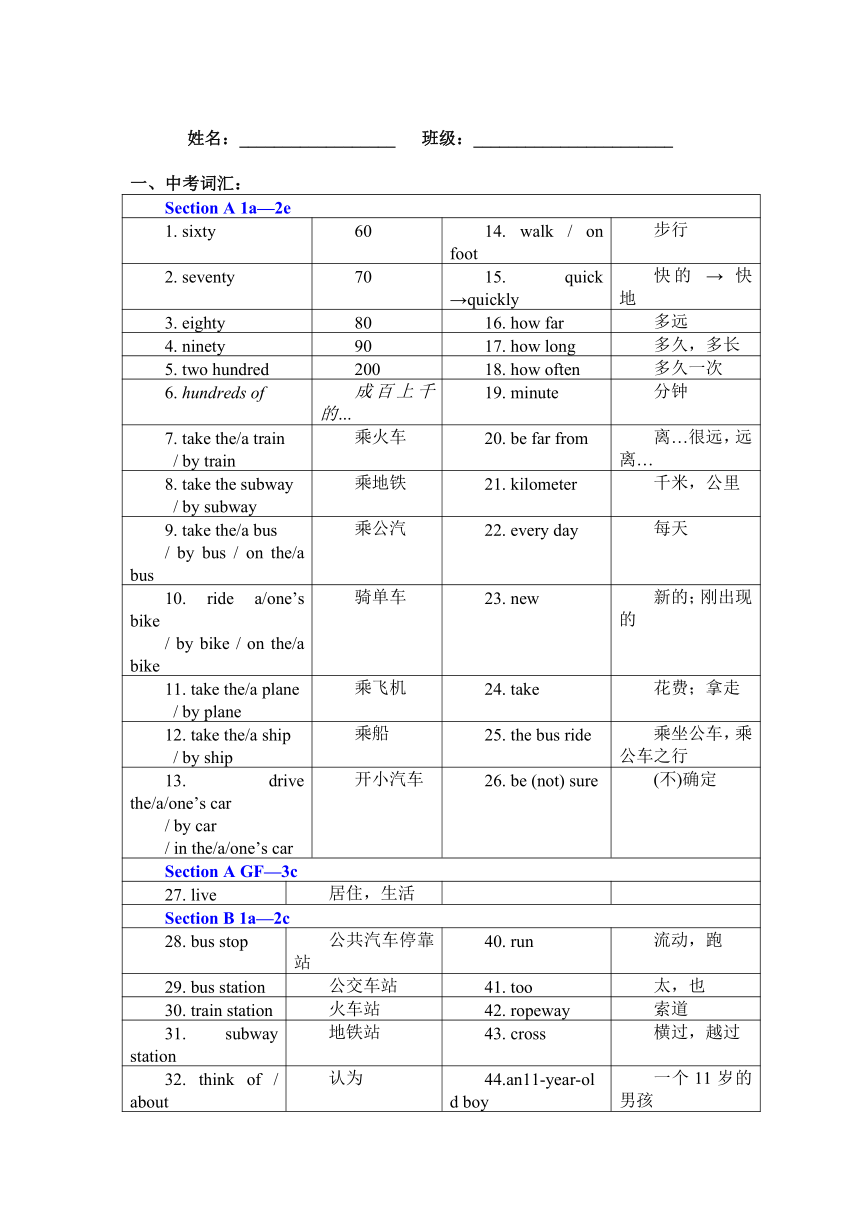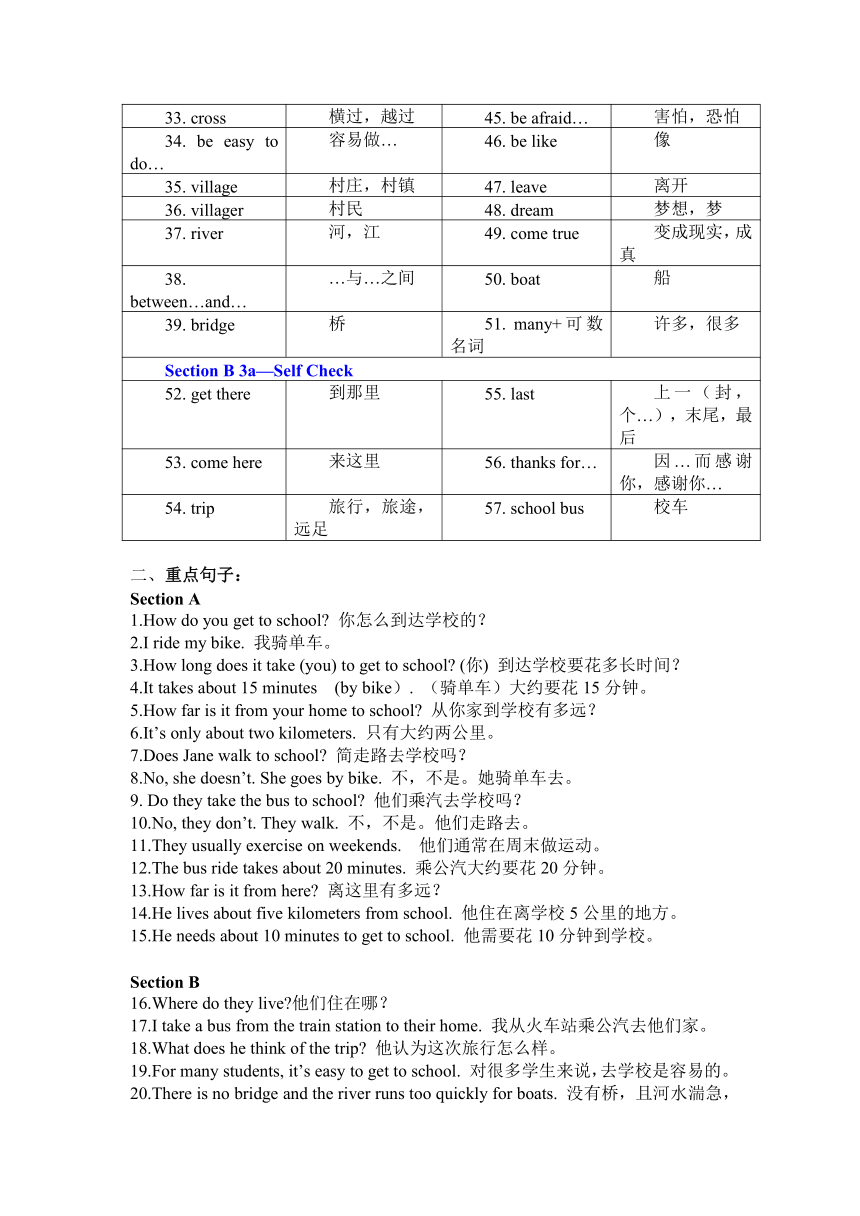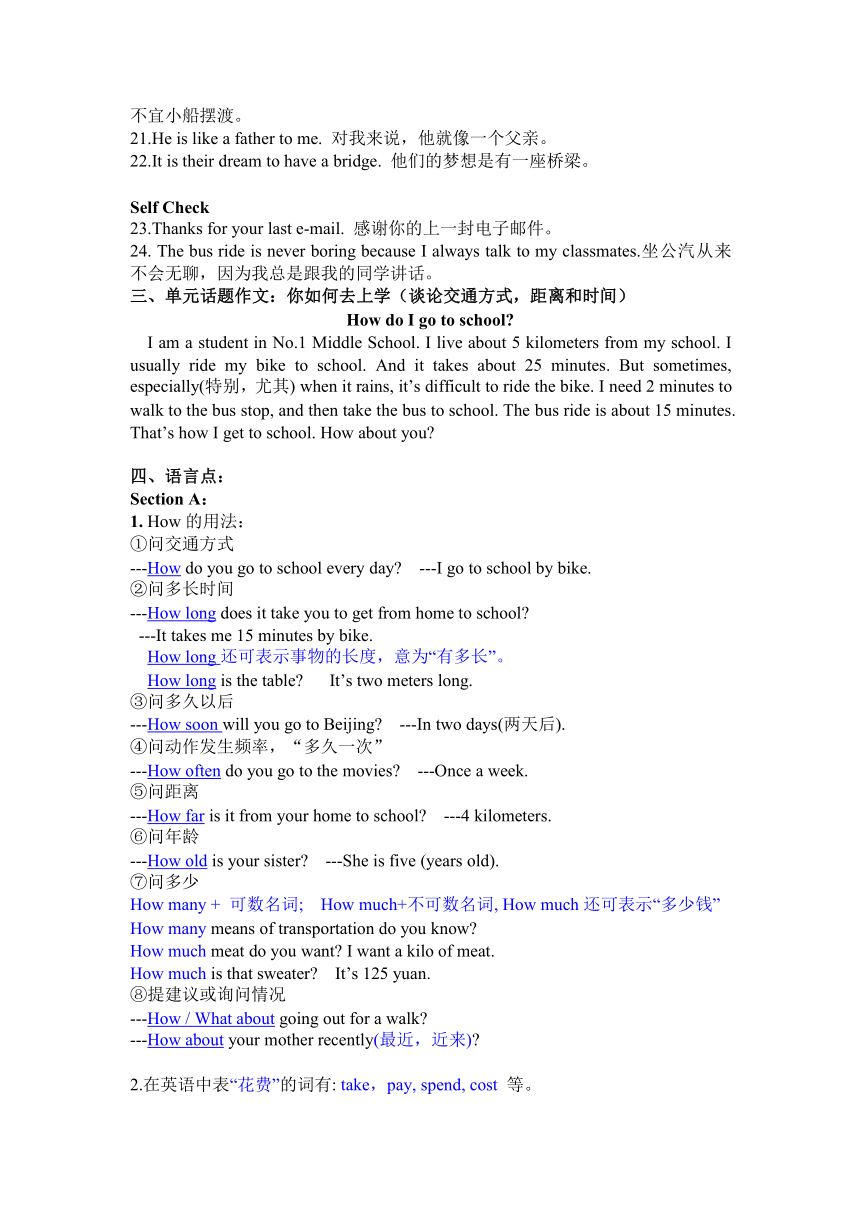Unit 3 How do you get to school? 单元学案
文档属性
| 名称 | Unit 3 How do you get to school? 单元学案 |  | |
| 格式 | zip | ||
| 文件大小 | 22.7KB | ||
| 资源类型 | 教案 | ||
| 版本资源 | 人教新目标(Go for it)版 | ||
| 科目 | 英语 | ||
| 更新时间 | 2013-03-13 20:17:01 | ||
图片预览



文档简介
姓名:__________________ 班级:_______________________
一、中考词汇:
Section A 1a—2e
1. sixty
60
14. walk / on foot
步行
2. seventy
70
15. quick →quickly
快的 → 快地
3. eighty
80
16. how far
多远
4. ninety
90
17. how long
多久,多长
5. two hundred
200
18. how often
多久一次
6. hundreds of
成百上千的…
19. minute
分钟
7. take the/a train
/ by train
乘火车
20. be far from
离…很远,远离…
8. take the subway
/ by subway
乘地铁
21. kilometer
千米,公里
9. take the/a bus
/ by bus / on the/a bus
乘公汽
22. every day
每天
10. ride a/one’s bike
/ by bike / on the/a bike
骑单车
23. new
新的;刚出现的
11. take the/a plane
/ by plane
乘飞机
24. take
花费;拿走
12. take the/a ship
/ by ship
乘船
25. the bus ride
乘坐公车,乘公车之行
13. drive the/a/one’s car
/ by car
/ in the/a/one’s car
开小汽车
26. be (not) sure
(不)确定
Section A GF—3c
27. live
居住,生活
Section B 1a—2c
28. bus stop
公共汽车停靠站
40. run
流动,跑
29. bus station
公交车站
41. too
太,也
30. train station
火车站
42. ropeway
索道
31. subway station
地铁站
43. cross
横过,越过
32. think of / about
认为
44.an11-year-old boy
一个11岁的男孩
33. cross
横过,越过
45. be afraid…
害怕,恐怕
34. be easy to do…
容易做…
46. be like
像
35. village
村庄,村镇
47. leave
离开
36. villager
村民
48. dream
梦想,梦
37. river
河,江
49. come true
变成现实,成真
38. between…and…
…与…之间
50. boat
船
39. bridge
桥
51. many+可数名词
许多,很多
Section B 3a—Self Check
52. get there
到那里
55. last
上一(封,个…),末尾,最后
53. come here
来这里
56. thanks for…
因…而感谢你,感谢你…
54. trip
旅行,旅途,远足
57. school bus
校车
二、重点句子:
Section A
1.How do you get to school? 你怎么到达学校的?
2.I ride my bike. 我骑单车。
3.How long does it take (you) to get to school? (你) 到达学校要花多长时间?
4.It takes about 15 minutes (by bike). (骑单车)大约要花15分钟。
5.How far is it from your home to school? 从你家到学校有多远?
6.It’s only about two kilometers. 只有大约两公里。
7.Does Jane walk to school? 简走路去学校吗?
8.No, she doesn’t. She goes by bike. 不,不是。她骑单车去。
9. Do they take the bus to school? 他们乘汽去学校吗?
10.No, they don’t. They walk. 不,不是。他们走路去。
11.They usually exercise on weekends. 他们通常在周末做运动。
12.The bus ride takes about 20 minutes. 乘公汽大约要花20分钟。
13.How far is it from here? 离这里有多远?
14.He lives about five kilometers from school. 他住在离学校5公里的地方。
15.He needs about 10 minutes to get to school. 他需要花10分钟到学校。
Section B
16.Where do they live?他们住在哪?
17.I take a bus from the train station to their home. 我从火车站乘公汽去他们家。
18.What does he think of the trip? 他认为这次旅行怎么样。
19.For many students, it’s easy to get to school. 对很多学生来说,去学校是容易的。
20.There is no bridge and the river runs too quickly for boats. 没有桥,且河水湍急,不宜小船摆渡。
21.He is like a father to me. 对我来说,他就像一个父亲。
22.It is their dream to have a bridge. 他们的梦想是有一座桥梁。
Self Check
23.Thanks for your last e-mail. 感谢你的上一封电子邮件。
24. The bus ride is never boring because I always talk to my classmates.坐公汽从来不会无聊,因为我总是跟我的同学讲话。
三、单元话题作文:你如何去上学(谈论交通方式,距离和时间)
How do I go to school?
I am a student in No.1 Middle School. I live about 5 kilometers from my school. I usually ride my bike to school. And it takes about 25 minutes. But sometimes, especially(特别,尤其) when it rains, it’s difficult to ride the bike. I need 2 minutes to walk to the bus stop, and then take the bus to school. The bus ride is about 15 minutes. That’s how I get to school. How about you?
四、语言点:
Section A:
1. How的用法:
①问交通方式
---How do you go to school every day? ---I go to school by bike.
②问多长时间
---How long does it take you to get from home to school?
---It takes me 15 minutes by bike.
How long还可表示事物的长度,意为“有多长”。
How long is the table? It’s two meters long.
③问多久以后
---How soon will you go to Beijing? ---In two days(两天后).
④问动作发生频率,“多久一次”
---How often do you go to the movies? ---Once a week.
⑤问距离
---How far is it from your home to school? ---4 kilometers.
⑥问年龄
---How old is your sister? ---She is five (years old).
⑦问多少
How many + 可数名词; How much+不可数名词, How much还可表示“多少钱”
How many means of transportation do you know?
How much meat do you want? I want a kilo of meat.
How much is that sweater? It’s 125 yuan.
⑧提建议或询问情况
---How / What about going out for a walk?
---How about your mother recently(最近,近来)?
2.在英语中表“花费”的词有: take,pay, spend, cost 等。
1) It + takes sb + some time + to do sth 做某事花了某人多少时间。
2) sth.+ cost + sb. +金钱 某物花了某人多少钱
3) sb+pay+金钱+ for+ sth. 某人花钱买某物。
如:She’s paying 50 yuan for the dictionary。她要花50元买这本字典。
4) sb + spend + 时间/金钱 (in) doing sth. 某人花了多少时间/钱做某事
如: He spent two hours (in) playing computer games.他玩了两小时电子游戏。
sb + spend + 时间/金钱 on sth. 某人花了多少时间/钱做在某事或某物上
如: She spent 150 yuan on the skirt. 她买那条裙子花了150元。
3. by bus, ride my bike 和 take the subway均表示“乘坐某种交通工具”。
1) “by + 表示交通工具的单数名词”在句中作方式状语, 名词前不需加任何限定词。
如: My sister goes to work by boat every day. 我姐姐每天乘船去上班。
2) “ride / take + 限定词 + 表示交通工具的名词” 在句中作谓语。
take a train to school=go to school by train.
take a ship to school=go to school by ship.
ride a bike to school=go to school by bike
take a bus to school=go to school by bus
take the subway to school=go to school by subway
walk to school=go to school on foot
drive a car to work = go to work by car
表示“乘坐某种交通工具”还可以用“on / in + 限定词 + 表示交通工具的名词”。
如:She often goes to school on the school bus. 她经常乘校车去上学。
He sometimes goes to school in his father’s car. 他有时坐爸爸的汽车去上学。
Section B:
4. no “完全不、根本没有”,当no 用于构成否定句时,主要用于名词前,强调否定其后的名词,相当于not any 如:There is no apple in the fridge. 冰箱里没有苹果了。
5. run在不同的语境中有不同的用法和含义。例如:
①The river runs too quickly for boats “run”表示 “流动”
②Who runs the business? “run”表示 “管理;经营”
③John run a car into a park. “run”表示 “使行驶;驾驶”
④The road runs north. “run”表示 “延伸”
⑤“run”可以做名词 表示 “奔跑, 路程” 如:
Let's go for a run across the fields. 咱们去跑步,跑过那片田野吧。
It is an hour's run by train from here to London. 从此地到伦敦搭火车有一小时的行程。
6. a 11-year-old boy 一个11岁的男孩。 类似结构还有很多,例如:
a four-day trip 一个四天的旅行 a 30-page book 一本30页的书
an 800-meter bridge 一座800米的桥
注意:这里的“year、day、page 、meter”都是用单数。
11-year-old 形容词,“11岁的…” 其后面 + 名词
11-year-olds 名词,“11岁的孩子们”
11 years old “11岁”
7. afraid 害怕,恐怕
be afraid of (doing) sth
be afraid to do sth
I am afraid of snakes. 我很害怕蛇。
He is afraid of going out at night. 他害怕晚上出门。
He is afraid to go out at night. 他害怕晚上出门。
8. too+形容词+for.. 对…来说太…
The river runs too quickly for boats. 河水流的太急,而不宜划船。
The dress is too long for me. 这条连衣裙对我来说太长了。
9. It is +形容词+(for sb.) + to do sth. (对于某人而言)做某事是……
在 “ it… to do sth. ”这个结构中,it 是形式主语, to do sth.才是真正的主语。如:
It is interesting to play badminton. 打羽毛球很有趣
It is their dream to have a bridge. 能有一座桥是他们的梦想。
For many students, it is easy to get to school. 对于许多学生而言,到达学校很容易。
It is not easy to cross the river on a ropeway. 靠滑铁索来过河不容易。
For the students in the village, it is difficult to get to school.
对于山村里的学生来说,到达学校有点难.
It is important for us to learn English well. 对于我们来说,学好英语很重要。
10. “到达”的表示法:
1)get vi.(不及物动词)
get + home/here/there等地点副词 get to + 地点名词
2)arrive vi. (不及物动词)
arrive + home/here/there等地点副词或不接任何地点
如:你什么时候到的?When did you arrive?
arrive in + 表示大地点的名词 arrive at + 表示小地点的名词
3)reach vt. (及物动词)
reach + 地点副词或地点名词
到达家 get home arrive home reach home
到达上海get to Shanghai arrive in Shanghai reach Shanghai
到达学校 get to school arrive at school reach school
五、课前小测:
第一课时:背诵/默写Unit2单元话题作文, ( 朗读P122-123 U3词汇 )
第二课时:朗读P122-123 U3词汇, 背诵/默写P14 2e
第三课时:背诵并默写P15GF
第四课时:听写中考词汇1-27(10-20个)和重点句子1-15(5-10个)
第五课时:听写中考词汇28-57(10-20个)和重点句子16-24(5-10个)
六、课堂检测:
第一课时:
一、单项选择
1.--- _______ is it from your home to school?
--- It’s about three kilometers.
A. how much B. how long C. how far D. how soon
2.—______ does it take you to get home from school?
— About ten minutes on foot.
A. How far B. How long C. How often D. How soon
3.--- ______ do you play football?
--- Once a week.
A. How much B. How long C. How often D. How far
二、填空题
1. My home is near. I ______(步行) to school.
2. Li Lei ______ the subway (乘地铁) to school.
3. His father often goes to Shanghai ____ ______(坐飞机).
4. If you don’t want to be late, you’d better ______ a _____(打的).
5. _______ ____ ____ (骑自行车) to work is good for our health, I think.
第二课时:
一、单项选择
1.The_______takes about 1hour from my home to the park.
A. bus ride B.ride bus C.ride a bus D. bus rode
2.Does he_____to school?
A. by bike B.on foot C.drive his car D.ride his car
3.---______ is it from the school library to your classroom?
--- About ten minutes’ walk.
A. How far B. How long C. How often D. How soon
二、短文填空。
Lucy 1 in the Zhongshan Road. She 2 in the No.6 Middle School. Every day she gets up early and goes to school early. Her home is a little far 3 her school. So she usually 4 a bus. It 5 about 40 minutes.
第三课时:
一、单项选择。
1. —How does he go to Hong Kong? —__________.
A. Take the plane B. By the plane C. By the air
2. —_______ do you live from school? — 8 miles.
A. How long B. How far C. Where
3. I usually go to school ________.
A. ride the bike B. on bike C. on the bike
4. ____ does it take her to get to school?
A. How many time B. How long C. How far
5. If they live around the river, they can go somewhere _______.
A. by train B. by taxi C. by boat
二、句型转换。
1. Mr. Smith often flies to Tokyo for the meeting. (同义句转换)
2. Every day her father comes to his company by car.(同义句转换)
3. My mother usually takes the bus to work. (变否定句)
4. I usually spend 3 hours doing my homework. (同义句转换)
5. His factory is 10 miles from his home. (对划线部分提问)
第四课时:
用适当的词填空,补全下面的短文:
? What do you do 1 weekends? Some people like to 2 at home, but others like to 3 for a walk 4 have a picnic. My friend Jack works hard in a factory during the 3 . on weekends he always 5 the same things. On Saturday he 6 his car to a supermarket which is 10 kilometers 7 from his home to buy a 8 of food and on 9 he takes his family to a nearby village.
七、课后作业:
第一课时:1、读熟P122-123 U3词汇, 抄写P122-123 U3 P13-15词汇
2、背诵并默写P14 2e
第二课时:1、背诵并默写P15GF
2、《学习辅导》Section A
第三课时:1、读熟并抄写P122-123 U3 P16-18词汇
2、复习中考词汇1-27和重点句子1-16
第四课时:1、《学习辅导》Section B --Self Check
2、复习中考词汇28-51和重点句子16-24
第五课时:1、朗读P124-124 U4词汇、在课文中找出来并注明中文
2、背诵并默写单元话题作文
同课章节目录
- Unit 1 Can you play the guitar?
- Section A
- Section B
- Unit 2 What time do you go to school?
- Section A
- Section B
- Unit 3 How do you get to school?
- Section A
- Section B
- Unit 4 Don't eat in class.
- Section A
- Section B
- Unit 5 Why do you like pandas?
- Section A
- Section B
- Unit 6 I'm watching TV.
- Section A
- Section B
- Review of Units 1-6
- Unit 7 It's raining!
- Section A
- Section B
- Unit 8 Is there a post office near here?
- Section A
- Section B
- Unit 9 What does he look like?
- Section A
- Section B
- Unit 10 I'd like some noodles.
- Section A
- Section B
- Unit 11 How was your school trip?
- Section A
- Section B
- Unit 12 What did you do last weekend?
- Section A
- Section B
